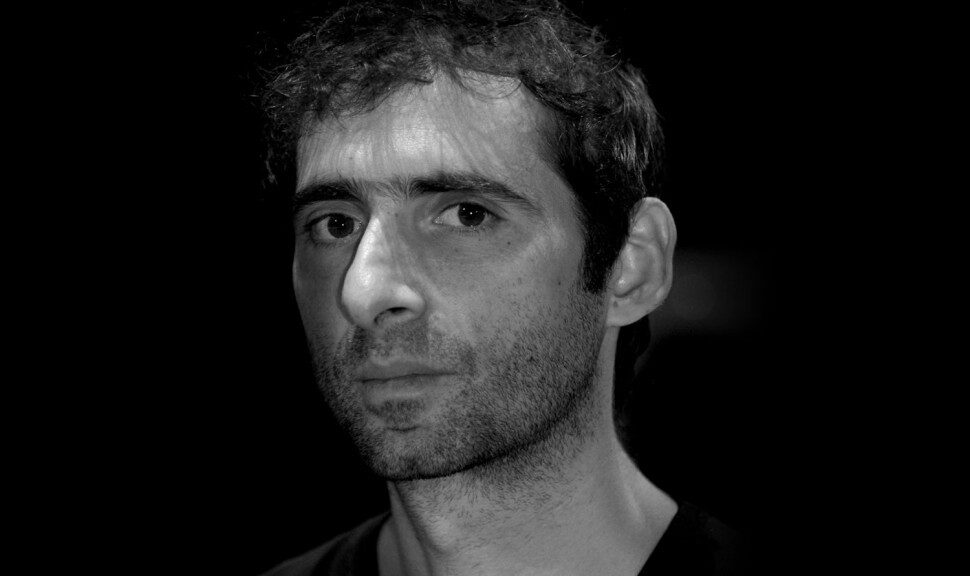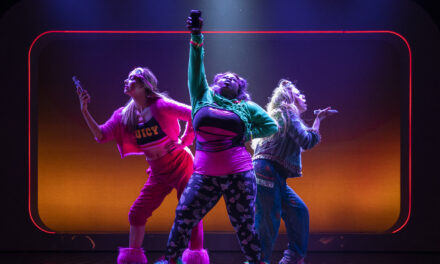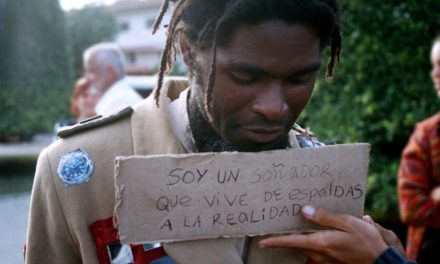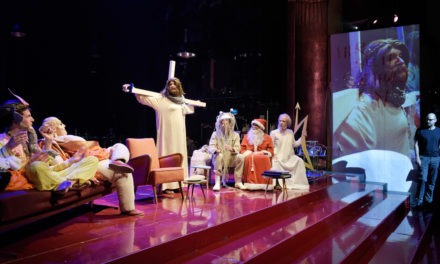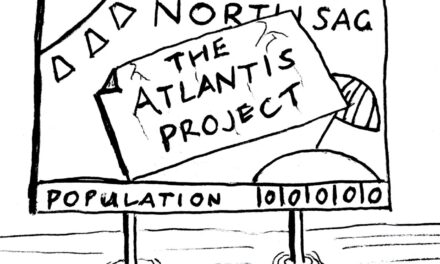Guillaume Clayssen, a fellow playwright, interviewed David Lescot on his newest piece in June 2016 and was translated for FrenchCulture.org by Jessica Cohen.
Dough, a choral text with a frantic and hectic rhythm that addresses our relationship with money will be performed by three actors. Note that the performances of Dough (Mon Fric) written and directed by David Lescot at The New Ohio Theater planned for April 2020 are postponed due to Covid-19.
Guillaume: How did you think of writing a piece about money?
David: In the beginning, the Comédie Française had asked for a short play about money. Ten contemporary authors were invited to write on this theme.
I had written a 20-minute play that was already thematically centered similar to Mon Fric: The entire life of a man told through the lens of money, from his birth to his death. In theatre, I like to recount lives in their entirety; a quick play in its finality partially performed and narrated.
Cécil (Backès) saw this 20-minute play and the dramaturgy interested her. She asked me – and I was thinking along similar lines at the time – if I could develop the play to make a long version. But, even within the elongated, the quick pace of the play remains. The long version isn’t really that long. This rewriting allowed me to tackle other dimensions, other moments in the character’s life.
Guillaume: How does having a character named “Moi”, change your theatrical writing? What does this clear proximity between the author and the narrator, which we often find in novels, provoke?
David: In this play, the narrator is truly the subject of the story. Creating theatrical work in the first person is not easy. Here, it’s about a man who narrates what we see, but also what we don’t see. There is a mix of narration and dialogue. I quite liking implementing this mix between the narrative form and dramatic form. There are some authors who achieve this back and forth between the two forms with great success. I’m thinking of a successful Swedish author whose work was put on in France by Michel Didym, Jonas Hassen Khemiri.
The other effect of using “Moi” in the writing of the play is a type of game with my own autobiography. I start with elements of my own story from which I start to deviate and take in new directions. In the play, there are real memories and events taking place that I had fun evolving in different ways. It’s a game of possibilities. It happened like this, but it could have happened differently. It doesn’t make much of a difference in the play whether you know which parts are true or not, but I want authentic facts to be at the root of a piece – It gives me more sociological credibility and a technique for certain elements. For me, this approach in the theatre is precious. I prefer that things aren’t too abstract.
This also allows me to set pieces in various historical periods. In the play, we go through the 1980s, for example. Thus, we have details that signal these years and permit us to reconstitute the era in a credible and authentic way.
Guillaume: In your writing, how do you manage to make theatre with a story from memory?
David: Through language. Mon Fric relies heavily on language, through the use of colloquial jargon, and direct address to the audience it could almost be interpreted as standup comedy, especially given how much the audience is absorbed. In this play, the audience acts as a confidante for the character and consistently addresses the audience over the course of the play.
Additionally, to transform a story into theatre, I must create characters by giving them specific ways of speaking, characteristics of language and nuances. Notably, I like acknowledging the music of speaking; I approach orality in a fairly musical way. The more precisely we observe spoken language, and its musicality, the more we can gain from the words being spoken. I believe it’s necessary to explore and study spoken language. Above all, it’s necessary to get rid of the habitual way that we approach language, that which passes through the filter of screenwriters and becomes televisual. Often, when we want to be realistic, we imitate televisual reality, which I strongly disagree with.
In order to find the musicality of spoken words, I listen to the dialogue I write by frequently reading aloud. In public places, I try to listen attentively to the environment around me, I also organize recordings. For certain plays, I self-recorded while talking with people, or recorded other people’s conversations. Then, I’d listen to them, transcribe them, and write based on this material.
In the play, the dialogues between “Moi” and his wife are notably written with the desire to rediscover the way that we speak to one another, even if it is smoothed out and transposed. For example, there are a lot of interruptions, the characters don’t always respond to each other. In the same sentence, there are shifts, characters interrupting themselves.
Finally, regarding language and musicality, I’m also interested in how that relates to native languages, foreign languages, and informal languages (for example, we do not speak to our friends in the same way that we speak in a professional setting) – we speak all of these languages. I seek to say things in the most accurate way possible, whether it be in a discussion, a debate, or the writing of a play. I also love challenges: I love to tackle themes that aren’t as common in contemporary dramaturgy, all the questions that seem like they should not be asked in theatre, such as Europe’s politics, the climate, etc.
But outside of this, I like to listen to everything that happens around me, to feel his time we live in, feel the society around me. To get this and reproduce it, makes me kind of like an echo, an altered echo, subjective and poetic – a space moving towards the present reality. I like both the critical and the subjective elements of theater.
To go back to Mon Fric, I have act like a monomaniac, only discussing Moi’s life through his relationship to money, It’s the theme of the play. We often say that the theme is not important. For me, it is the most important. And in this play, in particular, there is only one theme that we never stop talking about. the principle of melody and music is apparent within this and helps give the writing an identity. However, once you have used that melody for one piece, you can no longer use it for another because it’s essentially attached to that work.
Guillaume: Isn’t time the central and hidden character of the play?
David: I like to bring elements that are ordinarily excluded from the theater into my work, my treatment of time is an example of this. In his treaty of dramatic poetry, Aristotle affirms that a play cannot recount an entire life. I obviously have the desire to transgress this prohibition because, in order to be successful, you have to use unusual techniques.
With Mon Fric, I wanted to explore time in relation to a life without any interruptions. I did not want to put ellipses, blackouts, or subtitles with “15 years later” or “20 years later” in the story. The rule of the game that I created for the writing of this piece is to write life continuously. I wanted to create a single movement, with no segments. Plays like Mon Fric are essays, experiences.
This play, by its singular temporal structure, also questions acting. For me, the development of time in the play is comparable to an accelerated film of life in its editing effects. The influence of movies in my writing is definitely very strong. Film is an art that very much helped us enrich the story. fast-forwarding and slowing down are film processes. In theater, it is difficult to create this effect, unless you imitate cinema.
Finally, this principle of fast-forwarding in a play allows you to travel across multiple decades. Thus, Mon Fric recounts the passage of time, the passage of eras, and decades. In writing this play, I often thought in terms of decades: I cut life into decades. The unit of life, according to me, is the decade. In the play, I have fun going back to the semi-false theory of a philosopher friend. According to them, you dominate the world (or at least strive to) from forty- to sixty-years-old and learn how to die after the age of sixty. When this friend told me his theory, I died of laughter. And at the same time, it’s not an entirely false point of view. This friend also said that the second period of our lives is less philosophical because we start to distance ourselves from learning, and delay wisdom for as long as possible. While I’m thinking about it, I have to say that, at the end of the play, I do bring “Moi” into a certain type of wisdom.
Guillaume: What is the meaning of the spectral identity of all the characters of the play?
David: But all the characters of the play do not have a spectral identity! When I think of life in its entirety, I often ask myself the following question: What sample of humanity do you experience this journey with? Who are the people that you knew, crossed, loved, and hated in your life? I like this representation of existence a lot: Imagine all of the people who have been a part of your life.
One day, after Mon Fric, I would love to write Mes Potes — a play about somebody’s life through the friends that they had like bankers, customers in a rush, and people who counted, like the women with whom you had your child. In Mon Fric, there are three, very different lovers to “Moi”, and I drew my inspiration for the last one, Sylvaine, the cool hippy, from a friend that I do not see very often. She no longer buys anything, to the point of growing her own tobacco. This isn’t from greed, but because she doesn’t want to participate in our society, the exchange, and commerce. She has rock-solid resistance.
To return to the question of the spectral identity, I would say that even if “Moi” seems to discuss some strange ideas, we could also say that it’s about retrospection. For that, I was influenced by a play by Peter Handke that my father performed in when I was little called Introspection. The structure interests me the most; A man recounts his entire life, as a litany of acts, abstracts, and some facts. He recounts everything that he did, beginning with “I came into the world” and finishing with “I wrote this play.”
In Mon Fric, we are in the mind of “Moi”, as if he had the power to show us what is in his head. That is the structure of the play: he speaks to us in order to help us see better, to show us. In creating his autobiography, he revisits images, and we also see them.
Mon Fric is an autobiography and like in all autobiographies, it’s necessary to: give a point of view on what you are recounting, and to render the events that you are narrating exciting. If you only give commentary on what happened to you, it’s extremely boring. In autobiographical writing, opinions and commentary must be lively and thus, theatrical. And it’s through being lively in this way that you succeed in captivating your viewer. But it’s also true that he who recounts his life looks at himself and his story and connects historical events and eras. And in this way, autobiography is an interesting genre, because it mixes a lot of genres and modes of writing.
Without a doubt, Mon Fric is a live performance combination of film, literature, and theater. Nothing is ever pure.
This article was originally posted at FrenchCulture.org in March 2020 and has been reposted with permission. To read the original article, click here.
This post was written by the author in their personal capacity.The opinions expressed in this article are the author’s own and do not reflect the view of The Theatre Times, their staff or collaborators.
This post was written by Guillaume Clayssen.
The views expressed here belong to the author and do not necessarily reflect our views and opinions.

